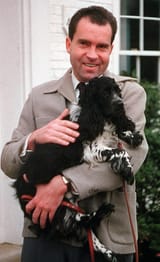Search Results
6/29/2025, 10:23:51 PM
>The Baltimore Sun noted that Nixon "did not deal in any way with the underlying question of propriety," while the St. Louis Post-Dispatch called the address "a carefully contrived soap opera". Columnist Walter Lippmann called the wave of support for Nixon "disturbing ... with all the magnification of modern electronics, simply mob law;" discussing the speech with a dinner guest, he said, "That must be the most demeaning experience my country has ever had to bear." Columnist Thomas Stokes criticized Eisenhower for equivocating on the question of his running mate until "the young man himself—the accused—had to step in and take over. And how he took over!" Through his presidency, Eisenhower would continue to be accused of being indecisive.
>According to Nixon biographer Conrad Black, the speech earned Nixon supporters throughout Middle America which he would keep through the rest of his life, and who would continue to defend him after his death. Critics, however, would later see the address as the "ultimate expression" of the controversial politician's "phoniness". Nixon biographer Stephen Ambrose stated that part of the audience considered the address "one of the most sickening, disgusting, maudlin performances ever experienced". In their analysis of the speech published just before Nixon's election as president in 1968, Robert S. Cathcart and Edward A. Schwarz suggested that while Nixon "met the accusation head-on and accomplished his immediate goals successfully, he ultimately created an image which led to a decline in his political career."
>As time passed, the Checkers speech became denigrated, and Nixon biographer Earl Mazo suggested that much of the attitude of "I don't like Nixon, but I don't know why," which contributed to the failure of his 1960 presidential run, can be traced to the Checkers speech.
>According to Nixon biographer Conrad Black, the speech earned Nixon supporters throughout Middle America which he would keep through the rest of his life, and who would continue to defend him after his death. Critics, however, would later see the address as the "ultimate expression" of the controversial politician's "phoniness". Nixon biographer Stephen Ambrose stated that part of the audience considered the address "one of the most sickening, disgusting, maudlin performances ever experienced". In their analysis of the speech published just before Nixon's election as president in 1968, Robert S. Cathcart and Edward A. Schwarz suggested that while Nixon "met the accusation head-on and accomplished his immediate goals successfully, he ultimately created an image which led to a decline in his political career."
>As time passed, the Checkers speech became denigrated, and Nixon biographer Earl Mazo suggested that much of the attitude of "I don't like Nixon, but I don't know why," which contributed to the failure of his 1960 presidential run, can be traced to the Checkers speech.
Page 1
